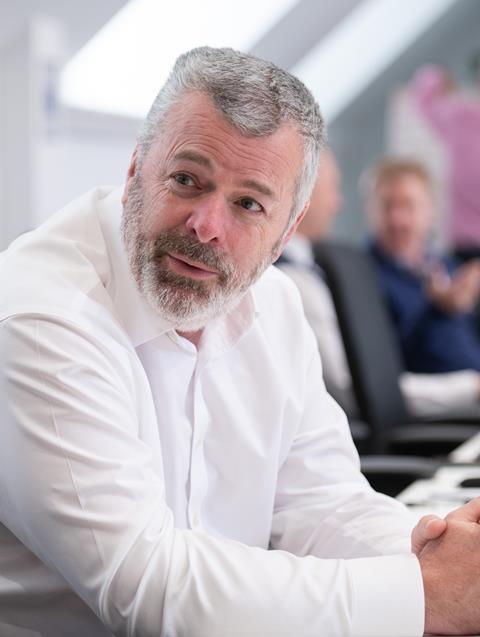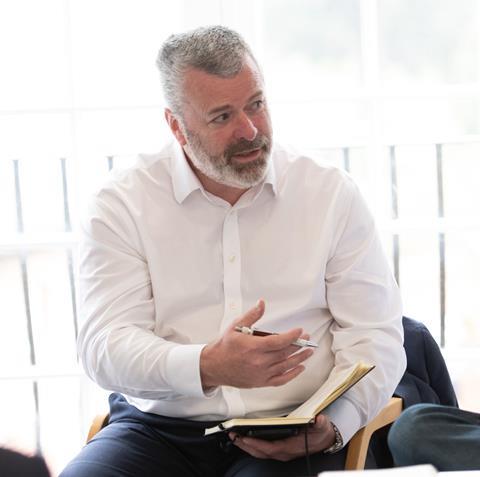Zenobē is fast-building a strong reputation for knowing its onions when it comes to supporting the industry in its journey to net zero. We caught up with Ian Dennis, Director of Business Development at Zenobē to find out why everybody is talking about the company.

In every decarbonisation chat we’re having currently, it seems people are talking about Zenobē (pronounced zen-oh-bee). Hard to define, the company epitomises the definition of a disruptor, re-writing the rules and breaking the traditional barriers of the industry. The company has secured an £870 million fighting fund from private equity firm KKR and existing investors Infracapital and it looks set to have a big part to play in the shift to net zero.
“Zenobē is an incredible business because we’re so diverse in terms of what we can do for customers,” explains Ian Dennis, Director of Business Development at Zenobē. We caught up with him recently to get the low down on the company and get some of his, and the company’s insights into navigating the decarbonisation journey ahead. “We are primarily an asset funder,” he adds, “we have an extensive portfolio of electric buses, coaches and HGVs which we’re supporting with financial products.”
So far, so traditional, but there’s more “and we also provide critical infrastructure to National Grid, and we’re very much into second life with regards to extending battery life,” he says demonstrating the business goes beyond the norm. “I guess I would sum up the Zenobē mission as maximising the speed and scale of the transition to clean energy and clean transport.
“We’re doing this through developing grid scale battery storage, to capture renewable energy for the Grid, but also by enabling organisations to electrify their fleets at speed. We’ve electrified over 75 depots to date.”
Although only formed in 2017, in the fast-paced world of energy innovation this makes Zenobē a relatively old-hand on the topic. Over the past seven years the company has been working with many bus, and now increasingly truck fleets, to build a wealth of knowledge, which is being used to give the company a significant competitive edge: “In respect, specifically, of the process of electrification, Zenobē has built up a significant level of expertise and experience,” explains Dennis, a relative newcomer to Zenobē but a well-known figure around the industry having spent a lifetime in asset finance, most recently at Ryder.
“Senior business leaders are making a lot of different and often difficult decisions as they transition their business. We’ve already been through that same process with a lot of clients. We’ve already developed the knowledge and experience of everything from what cable size you need, to how to lay out a site and all the other intricacies of electrifying a business.”
Similarly, this knowledge and experience extends to the electric vehicle itself and particularly batteries: “When we talk about asset funding, we’re not just speaking about the vehicle,” Dennis continues. “We’re now interested in splitting the battery from the vehicle and treating them as separate funding items and taking a residual value position on the battery. This is an entirely new scenario and one of the areas Zenobē is pioneering.
“We’ve also got the support tools and software that sits behind the business to look at, for instance, smart charging, battery management or battery optimisation to increase the efficiency and performance of the battery. Put all this together and we can say to a fleet operator, ‘we have a turnkey solution to electrify your fleet, to fund the vehicles and the charging infrastructure, to remove the risk in respect of the battery’ (one of their key concerns), and support them on this process. That’s a very compelling proposition.”
Uncertainty and risk is often banded around as a key barrier to the uptake of zero emission commercial vehicles and while Dennis is cognisant of these concerns, it’s clear Zenobē has an appetite for risk in this space, mitigated by the knowledge and experience the company has gained since 2017.

“Our focus on the battery as a separate asset from the vehicle is what sets us apart from many traditional funders,” he continues. “When the battery has degraded to a point where you can no longer use them to power the vehicle, those batteries will be redeployed for second life in our power skid solutions (a container-mounted battery storage solution, that sits in the Zenobē offering).
“We can build in battery replacement to our leasing facilities for the operator so when the battery warranty is expired, we can replace it. For the fleet, when the vehicle gets to five, six, eight years or whatever the battery warranty is, the battery will be replaced to ensure the truck can get on with fulfilling the intended duty cycle.
“Where we’re running our software to manage charging and vehicle performance, we will take the responsibility that they will be fully charged for the next day shift. If for any reason the vehicle or charger doesn’t work (and we’re running at something like 99.7% uptime by the way) then Zenobē will be on the hook for liquidated damages in respect of service.”
While the current market for zero emission vehicles is very much in its infancy, there is a huge fleet transition ahead and many are expecting profound change in the financing models required to facilitate this transition. Extended contract terms are going to be essential, says Dennis. “If you look at how traditional funding models have worked in the past, then financing a truck over five or seven years, perhaps with some sort of break facility [has been the norm]. Clearly with the ever-changing emission standards and other legislative updates, operators needed to make sure they had the latest kit for the job. When you’ve got a zero-emission truck there aren’t any emissions standards to worry about anymore, so why keep the truck for just three or five years? Why fund it over such a short period when the truck is designed to last somewhere in the region of 10 to 12 years?
“We expect battery degradation will impact on the operational usability of those vehicles and they won’t be able to perform the duties the operator had originally intended, hence we are putting a leasing deal together on the battery, to remove that element of risk and exposure for the operator. The operator has no risk then because your battery’s covered; you know you’ve got the performance guarantee in respect of the charging, and the operators can focus on electrifying the duty cycles that are appropriate to them.”
It’s this point about the suitability of electrification across particular duty cycles where we were keen to get Dennis’ thoughts. At Freight Carbon Zero, we’re surprised there’s not been more progress on the electrification of the short haul, back to base operation as this appears primed for electrification, yet the industry seems to be obsessed with finding solutions for the long-haul, hard to decarbonise applications.
“I’m of the belief we should start by focusing on the ‘easier to electrify’ operations,” he concurs. “Most back to base operations are very capable of being electrified where they’re running 100 to 150 miles a day, returning to depot and recharging either overnight or on an opportunity basis. We can use a lot of the expertise from the bus sector to adapt this into the HGV sector and make some significant progress.”
“We’re having conversations with people across a very, very broad spectrum involved in all manner of vehicle types,” he continues. “But always with the scenario there is destination charging available so they can move between different depots. This is available for deployment now: we can electrify today; optimise the fleet and make sure that it’s as efficient as possible, then you move on to these bigger obstacles.
“I’d love to be in a position that we could say we’re going to finance 100 tractor units for somebody, put them on to an operating lease and take a residual value on the battery and supply it along with the charging infrastructure, but the market is not yet mature enough to do that.”
In Part 2 of this interview, next week, we’ll dig a bit deeper into Ian Dennis’ views on residual values, contract lengths and “truck-as-a-service” – watch out for the update.
Ian Dennis will be appearing on stage at the Knowledge Zone at Road Transport Expo on 05 June 2024, where you’ll be able to see him interviewed by Freight Carbon Zero’s Andy Salter and ask some of your own questions. Sign-up to attend today…













